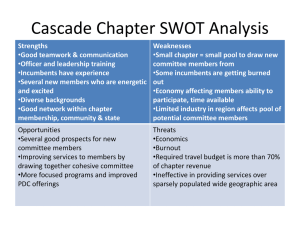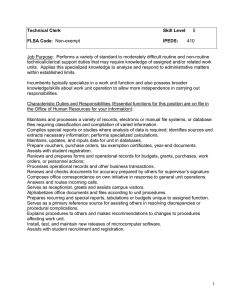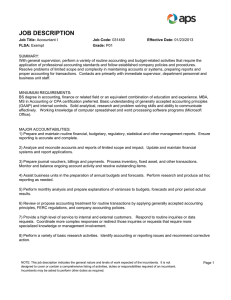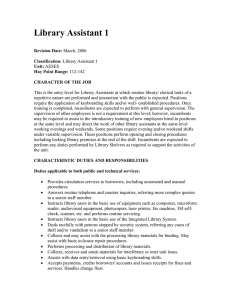WORD PROCESSOR
advertisement
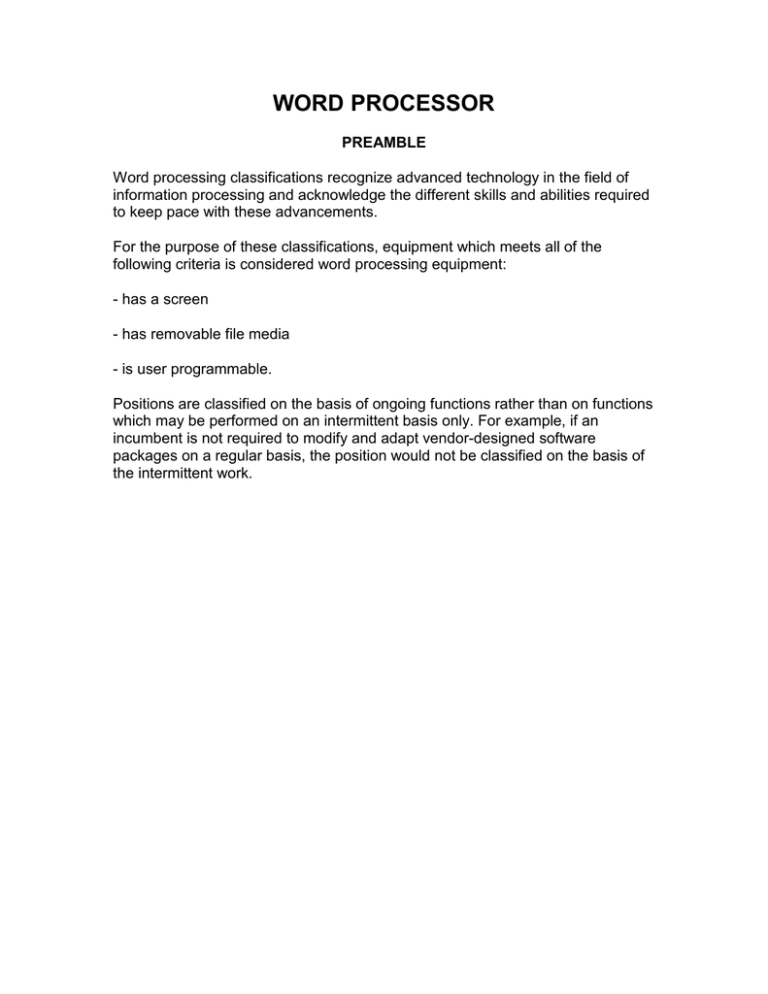
WORD PROCESSOR PREAMBLE Word processing classifications recognize advanced technology in the field of information processing and acknowledge the different skills and abilities required to keep pace with these advancements. For the purpose of these classifications, equipment which meets all of the following criteria is considered word processing equipment: - has a screen - has removable file media - is user programmable. Positions are classified on the basis of ongoing functions rather than on functions which may be performed on an intermittent basis only. For example, if an incumbent is not required to modify and adapt vendor-designed software packages on a regular basis, the position would not be classified on the basis of the intermittent work. WORD PROCESSOR 1 and 2 GENERAL Incumbents in this class are responsible for the operation of word processing equipment and the proofreading of work produced. While some clerical tasks may be performed, these will not represent the major part of the job. The 1 level is a trainee level where incumbents, under close supervision, learn to operate the equipment and perform basic functions such as text input, manipulation, edit, storage and retrieval. The training level also includes practical application of the newly-learned concepts on the job. Incumbents are hired at the 1 level and are moved to the 2 level when they become proficient in the application of the basic machine functions. (Operator proficiency will be determined by the Work Processing Supervisor.) The 2 level is the full working operator/proofreader level. Incumbents are expected to exercise initiative and independent judgment in interpreting instructions, determining format, layout, work methods to be employed and action to be taken on unusual matters. Some positions in this class function as unit leaders where the employee priorizes, assigns and checks the work of other operators within the unit. Operators are normally responsible for proofreading their own work. However, in large centres proofreading may constitute the major part of some jobs in this level. Proofreaders are responsible for the accuracy and quality of work completed on all types of office information systems equipment. As they are required to identify and actually correct errors, they must be qualified Word Processing Operators. Proofreaders keep track of the types of errors which occur and recommend means of improving quality. TYPICAL DUTIES Consults with authors to determine requirements of assignments. Offers guidance to authors on text preparation. Designs format for documents to be put on word processor. Priorizes work, keys, revises, manipulates, stores and retrieves text. Organizes and maintains a filing system for stored and recorded material. Proofreads printed documents. Ensures confidentiality and security of documents. Establishes record retention and disposal schedules in accordance with Provincial Documents Committee approvals. Sets up standby system to ensure documents are not lost or erased by system. Operates dictation/transcription equipment. Follows instructions from word processing procedures and equipment operation manuals and makes minor adjustments to equipment as required. Reads and interprets instructions. Maintains work log and equipment repair log. Maintains production records. May transmit or receive output via telecommunications options and maintain telecommunication log. May train operators on equipment and procedures. May be required to back up a computer terminal/data entry operator. May set up forms on printing and reproduction equipment. Performs other related duties as assigned. Knowledge, Abilities and Skills Knowledge of routine office procedures. Ability to pass Civil Service Commission typing test. Ability to adapt to and work with new types of equipment and changing work requirements. Ability to organize work and perform effectively in a production-oriented environment under time pressures. Ability to work effectively in a team environment. Ability to listen effectively and follow directions and defined procedures. Skill in spelling, punctuation, grammar and document composition. Skill in formatting and proofreading. Education, Training and Experience A minimum of one year's related office experience involving typing of a variety of business documents. Physical Standard Physically capable of performing the duties assigned. WORD PROCESSOR 3 GENERAL Incumbents in this class, under general supervision, have a high degree of specialization and are thoroughly familiar with word processing equipment capabilities. Using this knowledge, incumbents perform advanced functions and the most complex assignments on the word processing equipment. The incumbents are conversant with special machine applications and are required to modify or adapt these to the work environment. Using analytical and conceptual skills, incumbents identify uses for word processing within their department and assist management in deciding what is, or is not, suitable for word processing application. Using vendor-designed software packages as a guide, the incumbents design customized auxiliary functions to meet needs within their departments. Employees in this class may have some supervisory responsibility. TYPICAL DUTIES Analyzes requirements for specific projects. Communicates with and advises users on complex projects. Identifies uses for word processing application within the department and designs programs to meet departmental needs. Uses vendor-designed software packages as a guide to designing customized auxiliary functions. Recommends changes in procedures. Trains junior personnel on equipment and procedures. Priorizes and assigns work and compiles production statistics. Establishes procedures manuals. Performs advanced functions and the most complex assignments on the word processing equipment. Performs other related duties as assigned. QUALIFICATIONS Knowledge, Abilities and Skills Thorough knowledge of word processing equipment and capabilities. Good inter-personal communication and conceptual skills. Ability to analyze problems and develop machine solutions. Ability to organize work. Ability to pass Civil Service Commission typing test. Skill in spelling, punctuation, grammar and document composition. Skill in complex formatting and proofreading. Education, Training and Experience Several years' word processing experience and several years' related office experience. Physical Standard Physically capable of performing the duties assigned. WORD PROCESSOR 4, 5 and 6 GENERAL Incumbents in this class assume responsibility for the administration, coordination of activities and supervision of staff within a word processing centre. There is considerable and continuous pressure attached to these positions and the scope/complexity of work, decision making difficulty and technical knowledge required increase as you advance through the supervisory levels. The 4 level involves the supervision of staff within a department's word processing production unit. The 5 level is distinguished from the 1 level in that incumbents not only supervise a production unit but also co-ordinate the word processing activities of independent satellites within the department. The co-ordination of work performed in the production centre and at the independent satellites increases the difficulties associated with project priorization and problem solving. Incumbents also supply technical support and training to the independent satellites. Incumbents, therefore, require greater technical expertise and a thorough knowledge of the department's programs and objectives. The 6 level involves supervision and the co-ordination of activities for a crossdepartmental centre using multi-functional word processing equipment. Incumbents experience the greatest amount of pressure in setting priorities and in decision making. As the work comes from different departments with different objectives, there is greater possibility for conflict in priorization and incumbents therefore require a general knowledge of government programs and objectives. These positions encounter the greatest variety and complexity of work. Holding responsibility for the provision of technical support and consultation to other word processing centres, the incumbents require a thorough knowledge of multifunctional word processing equipment, systems capabilities and a working knowledge of government word processing programs, policies and procedures. TYPICAL DUTIES Creates an effective work environment. Analyzes word processing needs and makes recommendations for change. May design new programs and assist in the analysis of new equipment. Plans and implements programs to meet centre objectives. Establishes production standards and measurement program. Priorizes and assigns work. Guides staff on work station setup and adjustment. Guides staff on workflow, procedural and technical problems. Trains subordinates and measures performance. Prepares and updates departmental word processing procedures and manuals. Generates reports for operator statistics and production figures. Isolates, analyzes and resolves equipment, procedural and personnel problems. Identifies potential improvements within the department. Interacts with users. May operate word processing equipment. May provide training and technical support/consultation to other word processing installations. Performs other related duties as assigned. Knowledge, Abilities and Skills Thorough knowledge of word processing equipment, system capabilities and its impact on people. Good knowledge of the programs and operations of the department. Supervisory skills. Ability to communicate effectively at all levels of the organization. Ability to make sound independent decisions. Ability to assess priorities and provide overall co-ordination of activities. Education, Training and Experience Several years' word processing experience and a minimum of one year's administrative or supervisory experience. Physical Standard Physically capable of performing the duties assigned.

